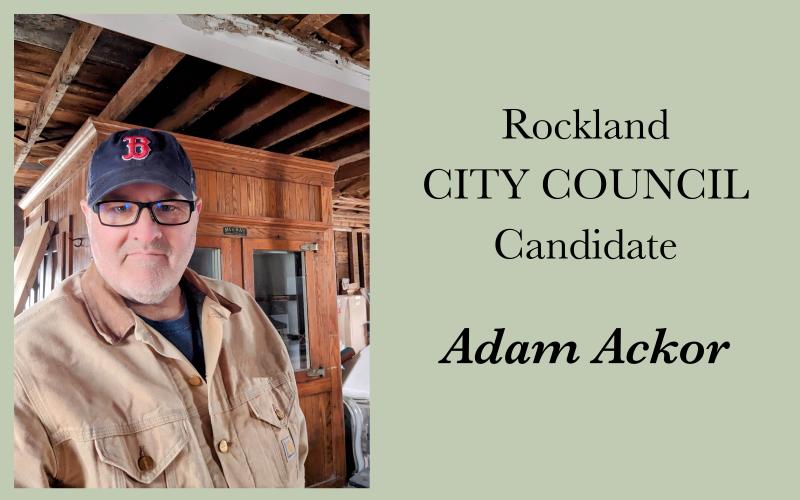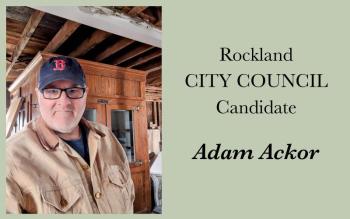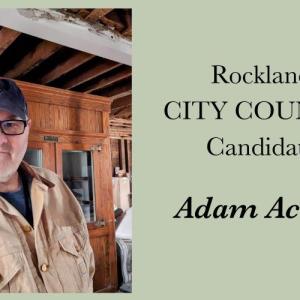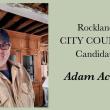On the issues: Rockland City Council Candidate Adam Ackor
Four candidates are competing for two open seats on the Rockland City Council, with elections set for Nov. 7. Both seats represent three-year terms. Those running for office are Adam Ackor, Nathan Davis, Kaitlin Callahan and Louise MacLellan.
Penobscot Bay Pilot has posed questions to each candidate, providing the opportunity for the public to better understand their positions on issues. Here, candidate Adam Ackor responds:
Please provide a concise biography of yourself
I was born in Augusta and grew up in Cushing. I graduated from the University of Maine with a B.A. and a concentration in U.S. History. My wife and I settled in Rockland in 1998. We purchased our home in Rockland in 2003. We have two children.
My work experience includes farming, shellfish harvesting, restaurant worker, construction laborer, carpenter, and project manager. I have owned my construction company since 2008, and spent two years working for the city of Rockland as the assistant code officer, and code officer.
I have served the city of Rockland as a member of the Comprehensive Planning Commission, the Educational Options Committee, and as a member of the City Manager Search Committee. I also served as an elected member of the Rockland City Council from 2016 to 2018.
What are Rockland's greatest strengths, and how do you hope to support them?
Rockland's greatest strength is in its people. We are a city of resilient, creative and self sufficient people that has been able to adapt to changing conditions fairly successfully over our nearly 200-year history. The people of this city have shown a willingness to be welcoming to newcomers, and also to come to the relief of fellow citizens who are in need of support.
My intention as a city councilor is to support our people in hopes of improving their quality of life and increasing our prosperity. I believe the council should act as a catalyst for innovation, investment and development, thereby increasing opportunities for people to achieve their aspirations.
What are Rockland's greatest issues to address?
I think the most pressing issue for Rockland is affordability. Median home prices are extremely high, while the median income level is relatively low. Our tax rate is high, one of the highest in the state of Maine, so it becomes increasingly difficult for people to remain in their homes.
The continued heartbreak of opioid addiction, overdose deaths, and a cycle of crime we are now seeing emerge among kids in their early teens has put a strain on our resources. We have pressing infrastructure needs as well, in particular our management of storm water and the repair of the Lindsey Brook.
Social Issues: Feel free to combine your answers concerning the following questions, because there are so many facets to the problems.
Rockland, the region, state and country remain locked in an opioid crisis. While the state has taken a leadership position in responding (see Maine Opioid Response) to the crisis, how would you, as a City Council member, work to build a healthier community?
Substance abuse, addiction and the proliferation of illicit drugs has been a problem in Midcoast Maine for decades. I think it is safe to say that most of us, if not all, have been touched in some way by the devastating effects of addiction.
At the council level, I think the best thing we could do is provide material and financial support to the greatest extent possible, to first responders who are on the front lines dealing with this every day, and also to organizations who specialize in treating people through intervention, counciling and recovery.
Rockland’s Police Dept., as well as Fire and EMS, face a constant barrage of overdoses and mental health crises in their line of work. How will you support them?
Rockland is really fortunate to have world class Police, Fire and EMS capabilities. What the council should do, is continue to provide material and financial support to our first responders and to represent these departments in public with dignity and respect.
A dearth of workforce housing is plaguing the region. What would you do to help encourage expansion of the housing stock for the middle and working classes? Should Rockland’s zoning ordinances support denser housing patterns and construction of accessory dwellings on smaller lots? Is there an ideal balance for regulating short term rentals and allowing property owners to earn money from short term rentals?
Rockland has a population level that has remained relatively flat for some time. We have roughly 7,000 full time residents, and I believe 3,000 – 3,500 dwelling units over 13 square miles of land area.
Since the early 1900s, zoning laws across the country have developed to separate business and industry from residential areas, and basically ensure and protect the financial values of residential neighborhoods. Rockland is no different. We currently have 26 distinct zones, and three overlay zoning districts, as well as a handful of contract zones.
Our zoning ordinance is complicated and very specific as it pertains to permitted and non-permitted uses within our land use regulations, and our bulk and space standards seem arbitrary at times.
Zoning is important, and the Rockland Planning and Code Department has made some really significant strides in simplifying the code through clarifying edits. I think the City Council should continue to work to reduce restrictions in our zoning ordinance which may be hindering development of more housing units.
I do not believe the city should be involved in regulating short term rentals. The reason I take this stance is because I have been in the position of regulating them as the city's Code Enforcement Officer.
There is no way to effectively enforce bans and restrictions of this nature without creating new layers of bureaucracy, or contracting with an outside company, at a substantial cost to the taxpayer. Further, research shows that even the most aggressive restrictions and enforcement tactics result in a paltry 5-10% compliance rate with very little revenue by way of fines or fees collected.
Rockland currenty issues licenses for roughly 40 STR-2, non owner-occupied vacation rentals. There may be 30 additional owners on the wait list for a license totaling 70. Not all of the current license holders actually rent their properties as vacation rentals, and many who do, also rent during the off season to people who are here temporarily for work or to attend a class or seminar.
So if we are talking about 70 units out of 3,500 total dwelling units available, then we are talking about 2% of our housing stock which may be utilized as a vacation rental.
The bottom line for me is that the government should have as little to do with your day-to-day life as is possible. I do not support a governmental intervention dictating who can stay at a private property and for how long.
Further, I believe vacation rentals contribute significantly to our economy. Conservative estimates for tourist dollars spent per day are around $200-300. If you take 30 vacation rentals, with an average of two people per unit, for an average of 90 days over the course of the tourist season, then these units add over $1 million to our economy, not to mention the additional money property owners spend to make repairs, advertise, and maintain these properties.
These units also fill a need conventional hospitality may not fill, by means of providing options for travelers with special needs.
There is likewise a rise in homelessness. How best can the city help to mitigate and alleviate that trend?
The City Council should continue to support the efforts of the Knox County Homeless Coalition. The causes of homelessness are often complex and there is no single solution to this problem.
I believe the best way for the City Council to help alleviate the growing problem of housing insecurity is to promote new development of both housing and commercial enterprises. Growing our tax base, increasing opportunities for higher paying, long term employment along with the development of additional housing units, will provide people with the stability and income needed to secure permanent housing.
Increased revenues may also provide opportunities for the council to increase funding opportunities for organizations specialized in dealing with some of the more chronic underlying issues surrounding homelessness, such as addiction, domestic violence and mental illness.
Public resources: What is your vision for Rockland Harbor given the increased demand for real estate, and Maine’s longtime goal to protect the working waterfront?
The city should continue to pursue public/private partnerships to enhance our harbor-adjacent public spaces, and potentially increase non property tax revenue.
The City Council should continue to prioritize and protect the working waterfront but we should also look at our zoning to identify areas where a more modern approach could yield development opportunities that create opportunity for employment, revenue and at the same time retain and possibly expand access to the the harbor for citizens.
The restoration of the Dry Dock restaurant, the pier and the Pearl is one example of how the city can work collaboratively with a developer to achieve what I see as a very positive outcome. I see tremendous potential in working with Safe Harbor, as well.
Does the city have enough public access to the ocean and lakes?
I believe we do have plenty of access to the ocean and lakes. I would be interested to hear from people who have different experiences in that regard.
What public projects do you feel important to tackle over the next several years?
I believe the most critical public works project we have to contend with is the Lindsey Brook and its tributaries. The separation of storm water from our sewer infrastructure is also an ongoing and critical public project that must be completed to the greatest extent possible.
Our public works department will continue to work to improve our streets and sidewalks, and we should establish some long term goals of improving our public recreation facilities, as well.
Local economy and taxes: Rockland’s mil rate is high, and the city has scheduled a revaluation. How will you help protect the Rockland property owner from ever-higher creeping taxes.
One of the principal roles of the City Council is to approve the funding necessary to provide the services we as citizens expect from our professional city staff. I have participated in the city budget approval process from both the council side, as well as acting as a department head, formulating a budget for the code office. I can attest to the strong commitment from both sides, in working to achieve a budget that will enable the professional city staff to deliver the highest level of service possible, while remaining focused on the need to keep our property tax rates as low as possible.
Expanding opportunities for development may help to expand our base, and increase revenue. Increased revenue may provide stabilization of tax rates, and possibly provide funding for additional programs or initiatives. The Rockland taxpayer pays one of the highest rates in the state at nearly double the state average. The Council should do everything they can to increase revenue, and resist the urge to impose new regulations which will curtail development and require additional staff to implement and enforce.
Knox County is attempting to rebuild its 911 call center following a personnel collapse, a situation that puts the spotlight on county government, its taxes on municipalities, and its budget. What will you do to be more aware of county services, and Rockland’s share in paying for those services?
The Knox County Commissioners appear to be focused on rebuilding the regional 911 call center staff. It is vitally important they succeed, and also identify where things have gone wrong in hopes of preventing a recurrence of what appears to be a leadership vacuum. The Rockland City Council should remain informed of what is going on at the county level, and have open lines of communication with the commissioners on matters relevant to the city's interest.
How do you see Rockland fitting into the greater regional economy and culture, and how would you like develop that?
The City of Rockland has been and will remain the economic hub of Knox County and has the potential to grow into one of the more consequential economic centers in the state.
While we are limited in our land area, we have the unique benefits of our large harbor, historic infrastructure, and diversity of businesses across a broad spectrum from commercial fishing to our world renown arts community.
My goal as a member of the City Council will be to seek opportunities for collaboration between the city, private business owners, and NGOs like the Penobscot Bay regional Chamber of Rommerce, or Rockland Main Street in an effort to improve the business climate. Integral to any effort to expand business opportunities, will be to simultaneously work toward improving our housing options, and continuing to support quality of life improvements including public parks, playgrounds, streets and sidewalks.
What is the importance of local government, and how do you see yourself, as a city councilor, in it?
Local government matters. A well functioning city council, consisting of people who are open minded, willing to listen, and willing to do the work necessary to keep the council functioning at a high level of competency is essential.
One has to be willing and able to work in collaboration with the rest of the council, setting aside personality conflicts, political opinions, and private agendas to work toward the common good. Councilors do not have to agree, but should agree to work with honesty and integrity on behalf of the citizens, and within the constraints of the city charter.
As a City Councilor, I see myself as a calm, measured, willing participant. I have enough experience in the operations of the city as both a former councilor, and a former department head/ member of the city staff, that I will not enter the role with uncertainty. I know perfectly well what the job entails, and requires. I am a collaborator, and I do not have a desire to be the loudest voice in the room.
Where are your favorite places to spend time in Rockland?
I have come to really appreciate walking both the Rockland Breakwater and the harbor trail. The Farnsworth Art Museum never gets old for me, and walking through the doors of Jess's Seafood Market, Ada’s Kitchen and Rock City Coffee all provide me with the comfort of something quintessentially Rockland.
Free space! Anything else you'd like to say to the voters that we haven’t considered?
Please get out and vote!



























